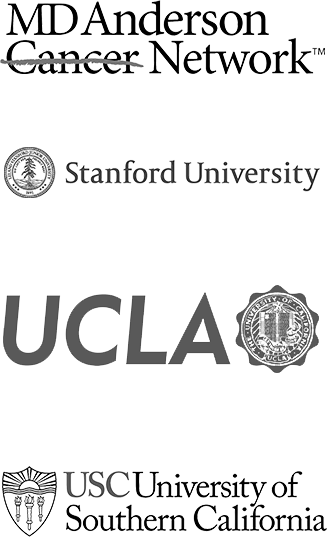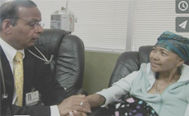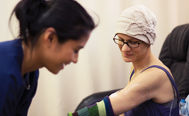Leiomyosarcoma
Leiomyosarcomas (LMS) are a very rare and typically aggressive form of soft tissue cancer. Soft/connective tissue tumors affect fat, blood, cartilage, muscles, tendons, nerves, and bone (osteosarcomas). Leiomyosarcomas originate in smooth muscle, and can grow in many different parts of the body, including:
- Stomach
- Intestines
- Uterus
- Lining of blood vessels
- Skin (cutaneous pilo erector muscles)
LMS affects the type of muscles known as involuntary, as opposed to muscles like biceps and triceps, whose movements we can control. The cancer specialists at the Sarcoma Oncology Center in Los Angeles are uniquely qualified and experienced in the diagnosis and treatment of connective tissue cancers and osteosarcomas (bone cancer). Because soft tissue cancers are generally very rare, many oncologists only treat a handful of cases throughout their tenure, making it especially important to work with a team of sarcoma specialists with comprehensive diagnostic and treatment experience.
LMS Symptoms and Risk Factors
A direct cause for the development of leiomyosarcoma and other sarcomas is not always clear. There are a few factors that are believed to contribute to and potentially increase the risk for some people:
Genetic disorders and hereditary syndromes – hereditary retinoblastoma, Li-Fraumeni syndrome, familial adenomatous polyposis, neurofibromatosis, tuberous sclerosis, Werner syndrome
Chemical exposure – herbicides, dioxin, arsenic
Radiation – treatment for other forms of cancer
Like all forms of cancer, sarcomas result from a malfunction in the DNA that causes damaged cells to multiply and form tumors. Each type of cancer corresponds to a mutation in a specific gene, which determines whether it develops into uterine or bone cancer. Other common soft tissue cancers are:
- Alveolar soft part sarcoma
- Angiosarcoma
- Clear cell sarcoma
- Dermatofibrosarcoma protuberans
- Desmoplastic small round cell tumor
- Epithelioid hemangioendothelioma
- Epithelioid sarcoma
- Extrarenal rhabdoid tumor
- Fibrosarcoma
- Gastrointestinal stromal tumor
- Hemangiosarcoma
- Infantile fibrosarcoma
- Inflammatory myofibroblastic tumor
- Kaposi’s sarcoma
- Leiomyosarcoma
- Liposarcoma
- Lymphangiosarcoma
- Malignant fibrous histiocytoma
- Malignant peripheral nerve sheath tumor
- Myofibrosarcoma
- Myxofibrosarcoma
- Neurofibrosarcoma
- Perivascular epitheliod cell tumor (PEComa)
- Rhabdomyosarcoma
- Synovial sarcoma
Diagnosing LMS
People with LMS tumors do not always experience symptoms in the early stages, and since they can be located anywhere in the body, specifically in the smooth involuntary muscles that we do not control, they can be somewhat difficult to diagnose. When symptoms do present, they are usually in the form of pain, inflammation, swelling, and painful lumps.
If a lump or abnormalities are detected, a detailed medical history and physical exam, along with diagnostic imaging tests including X-ray, CT scan, PET scan, and bone scan may be ordered. If your oncologist at Sarcoma Oncology Center determines that a biopsy is necessary, a sample of the tissue will be taken and sent to a lab for evaluation.
Soft Tissue Cancer Treatment in Los Angeles
Like most cancers, sarcomas are assigned a stage and grade at the time of diagnosis, which categorize how aggressive and likely to spread (metastasize) the tumors are, and whether they have already spread to neighboring lymph nodes and other parts of the body. Treatment options vary from patient to patient, and depend on a number of factors.
The oncology team at Sarcoma Oncology Center is at the forefront of the most promising clinical trials and research currently underway in the industry. Depending on their pathology report (a combination of each patient’s test results and unique health profile that allows radiologists and the medical team to better understand their cancer’s behavior in order to design an effective treatment plan). The main categories of treatment at the center are typically made up of a combination of:
- Chemotherapy
- Radiation
- Surgery
- Alternative treatment
There are many variations and subgroups of the various categories of soft tissue sarcomas. Some types, like osteosarcomas found in the long bones of the arms and legs, can be more common in children and adolescents, while other types are predominantly found in older adults. In addition to LMS, the Sarcoma Oncology Center in Santa Monica, CA offers specialized treatment for:
- Fibrohistiocytic
- Liposarcoma
- Skeletal muscle
- Osteosarcoma
- Vascular
- Fibroblastic/Myofibroblastic
- Uncertain differentiation
Supplemental Patient and Family Support
In addition to the many medical and physical needs and challenges that a person will face after a cancer diagnosis, there are many emotional, psychological, and spiritual concerns to take into account as well, for both the patient and their family and network of caregivers. The dedicated staff at Sarcoma Oncology Center takes great care to take every aspect of a patient’s care and well being into account, from the first appointment and X-ray to each round of radiation and chemotherapy. This includes access to support groups, education, assistance with travel and logistical planning for out of town patients and their families, and other support services designed to address each patient’s medical and quality of life needs.
Contact a Leiomyosarcoma Specialist in Los Angeles
For more information of diagnostic and treatment options for smooth muscle tissue tumors, contact an oncologist at the Sarcoma Oncology Center by calling 310-879-1106 to schedule an appointment today.
Next, read Malignant Hemangioendothelioma




